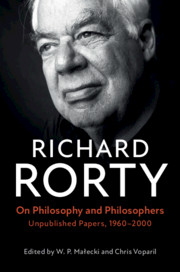Book contents
- On Philosophy and Philosophers
- On Philosophy and Philosophers
- Copyright page
- Contents
- Acknowledgments
- Note on Sources
- Introduction: Rorty as a Critical Philosopher
- I Early Papers
- 1 Philosophy as Ethics
- 2 Philosophy as Spectatorship and Participation
- 3 Kant as a Critical Philosopher
- 4 The Paradox of Definitism
- 5 Reductionism
- 6 Phenomenology, Linguistic Analysis, and Cartesianism: Comments on Ricoeur
- 7 The Incommunicability of “Felt Qualities”
- 8 Kripke on Mind-Body Identity
- II Later Papers
- Index of Names
4 - The Paradox of Definitism
from I - Early Papers
Published online by Cambridge University Press: 10 October 2020
- On Philosophy and Philosophers
- On Philosophy and Philosophers
- Copyright page
- Contents
- Acknowledgments
- Note on Sources
- Introduction: Rorty as a Critical Philosopher
- I Early Papers
- 1 Philosophy as Ethics
- 2 Philosophy as Spectatorship and Participation
- 3 Kant as a Critical Philosopher
- 4 The Paradox of Definitism
- 5 Reductionism
- 6 Phenomenology, Linguistic Analysis, and Cartesianism: Comments on Ricoeur
- 7 The Incommunicability of “Felt Qualities”
- 8 Kripke on Mind-Body Identity
- II Later Papers
- Index of Names
Summary
This paper and the one that follows it exemplify Rorty’s use of his early metaphilosophical insights to take on then-prominent topics in linguistic philosophy. “The Paradox of Definitism” critiques modern philosophy’s pervasive privileging, in metaphysics and epistemology, of sharp-edged definiteness over fuzzy indefiniteness, where the latter is deemed a function of human “ignorance and confusion,” rather than, with Aristotle, seen as something existing in nature. Dubbing this bias “definitism,” Rorty characterizes it as “the view that there is nothing which can reasonably be called a statement which is neither true nor false.” A “resurrection’ of pragmatism, he argues, with its contextualism, creates problems for definitists. But he also invites definitists into the pragmatist camp to avoid the paradox they face by recognizing Dewey’s insight that “every transaction will involve both fuzzy and non-fuzzy elements” and Peirce’s view of logic “as a normative rather than a descriptive discipline.”
- Type
- Chapter
- Information
- On Philosophy and PhilosophersUnpublished Papers, 1960–2000, pp. 65 - 79Publisher: Cambridge University PressPrint publication year: 2020

